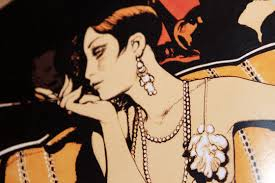
My first book, Mop Men: Inside the World of Crime Scene Cleaning, was commissioned by Julia Rochester of Corvo Books way back when. At that point I was writing articles for magazines and newspapers (there were also a couple of dreadful first attempts at novels tossed in the bottom of the wardrobe). But it wasn’t until I got to work with Julia on Mop Men: Inside the World of Crime Scene Cleaning that I really began to understand why and how I wanted to write.
“Have you read Goodbye to Berlin by Christopher Isherwood?” Julia asked as we discussed her notes on the first draft.
She quoted the following passage, which is from the opening of Christopher Isherwood’s Goodbye to Berlin:
I am a camera with its shutter open, quite passive, recording, not thinking. Recording the man shaving at the window opposite and the woman in the kimono washing her hair. Some day, all this will have to be developed, carefully printed, fixed.
I already enjoyed finding patterns and rhythms in the simplest of actions, like the man shaving, or the woman washing her hair. When finding patterns and rhythms in the things we often overlook, fixing them in words, the most mundane task can become beautiful. But the idea of a calm, passive recording really influenced me, and helped me get rid of me, at least when I was writing.
Right now I am writing an erotic crime novel (an odd choice for me). I have spent some time experimenting with how to write sex scenes. In the beginning they kept making me laugh. It felt silly. My amusement was not making for great sex. But then I remembered my chat with Julia and I took Goodbye to Berlin off the shelf and read the passage again.
That’s it, I reminded myself, become a camera, quite passive, record, don’t think. In real life this would make me a Peeping Tom of the worst kind. As a writer, however, this passage always sets me back on track. It reminds me to leave enough space for the reader to populate the story with his or her own memories and references, whether conscious or otherwise.
If I write, his thin, calloused hand caresses her dark, voluptuous breast our mind serves us pretty much that: a horrible image conjured by a horrible sentence. But if I write simply, his hand caressed her breast, our mind will give us all a similar movement, but we will each see a different hand, a different breast. More than likely we will see something beautiful built upon a memory, or a fantasy. We might see our lovers. But if the character had previously been slipped out of a blue summer dress we might conjure up the image of a woman wearing a blue summer dress that we saw waiting for a bus 10 years ago.
That’s what I love about writing, and it’s what I love about that passage. It reminds me there is nothing more interactive than good, simple storytelling.
Get a digital copy of Mop Men below:
 |
 |
 |
 |
